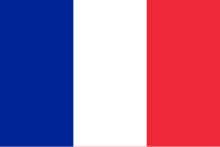ܦܪܢܓܝܐ
Jump to navigation
Jump to search
Assyrian Neo-Aramaic[edit]


Etymology 1[edit]
From Classical Syriac ܦܪܢܓܝܐ, from Persian فرنگ (farang, “Frank”), an appellation given originally by the Arabs to the French; and afterwards to all crusaders, Christians, or Europeans except those of the Ottoman Empire. Ultimately from Old French franc and Latin Francia.
Alternative forms[edit]
- ܦܪܲܢܣܵܐ (pransā)
Pronunciation[edit]
Proper noun[edit]
ܦܪܲܢܓܝܵܐ • (prangyā) f
- France (a country in Western Europe)
- Synonym: (official) ܩܘܼܛܢܵܝܘܼܬ݂ܵܐ ܦܪܲܢܓܵܝܬܵܐ (quṭnāyūṯā prangāytā)
- ܡܕ݂ܝܼܢ݇ܬܵܐ ܐܵܪܸܫܟ݂ܵܝܬܵܐ ܕܦܪܲܢܓܝܵܐ ܝܠܵܗ̇ ܦܵܪܝܼܣ.
- mḏītā ārišḵāytā d-prangyā ìlāh pārīs.
- The capital city of France is Paris.
- (archaic) Francia, Frankland, Frankish Empire
- (dated) Western world, especially Europe
Etymology 2[edit]
From the above + -ܝܐ (-āyā, the attributive adjective ending).
Alternative forms[edit]
- ܦܪܲܢܣܵܝܵܐ (pransāyā)
Pronunciation[edit]
Adjective[edit]
ܦܪܲܢܓܵܝܵܐ • (prangāyā) (feminine ܦܪܲܢܓܵܝܬܵܐ (prangāytā), plural ܦܪ̈ܲܢܓܵܝܹܐ (prangāyē))
- French (of or pertaining to France, its culture, its people, or its language)
- Frankish (of or pertaining to the Franks)
Noun[edit]
ܦܪܲܢܓܵܝܵܐ • (prangāyā) m sg (plural ܦܪ̈ܲܢܓܵܝܹܐ (prangāyē), feminine ܦܪܲܢܓܵܝܬܵܐ (prangāytā))
Inflection[edit]
Inflection of ܦܪܲܢܓܵܝܵܐ (prangāyā)
| number | isolated forms | with possessive pronouns | |||||
|---|---|---|---|---|---|---|---|
| state | form | person | singular | plural | |||
| m | f | ||||||
| singular | absolute | – | 1st person | ܦܪܲܢܓܵܝܝܼ (prangāyī) |
ܦܪܲܢܓܵܝܲܢ (prangāyan) | ||
| construct | ܦܪܲܢܓܵܝ (prangāy) |
2nd person | ܦܪܲܢܓܵܝܘܼܟ݂ (prangāyūḵ) |
ܦܪܲܢܓܵܝܵܟ݂ܝ (prangāyāḵ) |
ܦܪܲܢܓܵܝܵܘܟ݂ܘܿܢ (prangāyāwḵōn) | ||
| emphatic | ܦܪܲܢܓܵܝܵܐ (prangāyā) |
3rd person | ܦܪܲܢܓܵܝܹܗ (prangāyēh) |
ܦܪܲܢܓܵܝܵܗ̇ (prangāyāh) |
ܦܪܲܢܓܵܝܗܘܿܢ (prangāyhōn) | ||
| plural | absolute | – | 1st person | ܦܪ̈ܲܢܓܵܝܝܼ (prangāyī) |
ܦܪ̈ܲܢܓܵܝܲܢ (prangāyan) | ||
| construct | ܦܪ̈ܲܢܓܵܝܲܝ (prangāyay) |
2nd person | ܦܪ̈ܲܢܓܵܝܘܼܟ݂ (prangāyūḵ) |
ܦܪ̈ܲܢܓܵܝܵܟ݂ܝ (prangāyāḵ) |
ܦܪ̈ܲܢܓܵܝܵܘܟ݂ܘܿܢ (prangāyāwḵōn) | ||
| emphatic | ܦܪ̈ܲܢܓܵܝܹܐ (prangāyē) |
3rd person | ܦܪ̈ܲܢܓܵܝܘܼܗܝ (prangāyūh) |
ܦܪ̈ܲܢܓܵܝܘܿܗ̇ (prangāyōh) |
ܦܪ̈ܲܢܓܵܝܗܘܿܢ (prangāyhōn) | ||
Derived terms[edit]
- ܦܪܲܢܓܵܐܝܼܬ݂ (prangāˀīṯ, “French language”)
Categories:
- Assyrian Neo-Aramaic terms derived from Classical Syriac
- Assyrian Neo-Aramaic terms borrowed from Persian
- Assyrian Neo-Aramaic terms derived from Persian
- Assyrian Neo-Aramaic terms derived from Old French
- Assyrian Neo-Aramaic terms borrowed from Latin
- Assyrian Neo-Aramaic terms derived from Latin
- Assyrian Neo-Aramaic terms with IPA pronunciation
- Assyrian Neo-Aramaic lemmas
- Assyrian Neo-Aramaic proper nouns
- Assyrian Neo-Aramaic feminine nouns
- aii:France
- aii:Countries in Europe
- aii:Countries
- Assyrian Neo-Aramaic terms with usage examples
- Assyrian Neo-Aramaic terms with archaic senses
- Assyrian Neo-Aramaic dated terms
- Assyrian Neo-Aramaic adjectives
- Assyrian Neo-Aramaic nouns
- Assyrian Neo-Aramaic masculine nouns
- aii:Nationalities